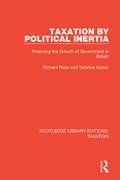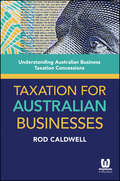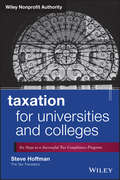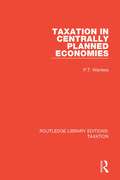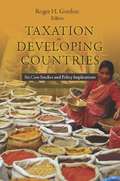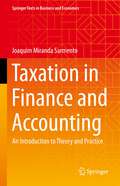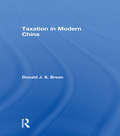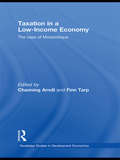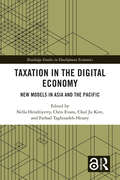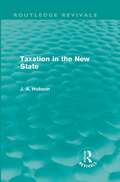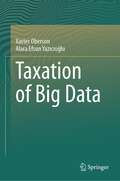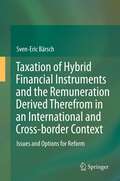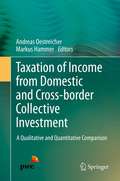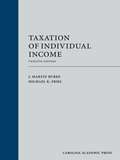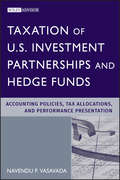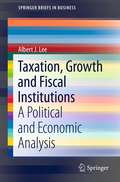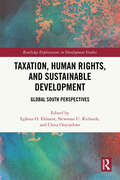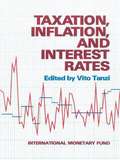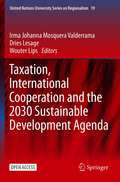- Table View
- List View
Taxation and Society in Twentieth-Century Argentina (Studies of the Americas)
by José Antonio Sánchez RománThis book provides a historical narrative of the Argentine tax system in the twentieth century. It argues that the failure to build permanent trust between the state and the civil society and the unraveling of confidence within Argentine society itself account for the collapse of the progressive tax system.
Taxation and the Household Saving Rate: Evidence from OECD Countries
by Vito Tanzi Howell H. ZeeA report from the International Monetary Fund.
Taxation by Political Inertia: Financing the Growth of Government in Britain (Routledge Library Editions: Taxation #8)
by Richard Rose Terence KarranThis book, first published in 1987, is a study of the political processes that underlie the determination of taxation – and much else – in the centuries-old government of Britain. Governments inherit a large legacy of policies, and it is the inertia force of past commitments that determine much of what a government does. This is especially true of taxation, and this book explores the forces at work on the policies of taxation. It also helps us understand what might be the future of taxation.
Taxation for Australian Businesses: Understanding Australian Business Taxation Concessions
by Rod CaldwellSimplify tax and save money with streamlined bookkeeping Small businesses are often just that--small. <P><P>Bookkeepingmay be done by a professional outside the company, but more oftenfalls to an employee or the business owner, who may or may not bewell-schooled in the intricacies of tax law and businessregulations. Tax time can end up costing small businesses a fortunein either professional fees or missed deductions every year. Whatif you could simplify the process and save money?Taxation for Australian Businesses: Understanding AustralianBusiness Taxation Concessions is the ultimate guide to taxfor the small business owner. Author Rod Caldwell, 20-year veteranof the Australian Taxation Office, leads you through the process ofmanaging your books and keeping more straightforward records tosimplify the process of filing tax. The introduction of the GST andthe new tax system involves a lot of new work for business owners,but Taxation for Australian Businesses eases the way byexplaining the intricacies of applicable tax law, fully updated toparallel the May 2014 budget. Topics include:Business structures, accounting systems, and cashaccountingFBT, private versus domestic use, and when to record apaymentMotor vehicles, the GST, and depreciationOwners salary, end of period processing, and how to account forstock tradingThe book explains everything you need to know and ties it alltogether to show you how to put the information into practice. Nojargon, no textbooks, just common sense and reason. If you wouldlike to get your bookkeeping straightened out and get back to yourbusiness, Taxation for Australian Businesses: UnderstandingAustralian Business Taxation Concessions is the one guide thatwill get you there quickly.
Taxation for Universities and Colleges
by Steve HoffmanThe "Tax Translator" offers much needed advice and guidance on tax compliance for institutions of higher learningCollege and university officials often are unaware of their institutions' tax obligations. Especially for institutions without designated tax compliance officers, the consequences of such ignorance can devastating. Based on its author's decades of experiences as a tax manager at three universities, this handbook was written for all university staff involved with tax compliance--from the account clerk in the Accounts Payable Department, up through vice presidents, controllers, treasurers and directors. Steve Hoffman explains the core principles and practices that inform current tax policy and develops a framework for building a system for effective tax compliance, reporting and filing. Satisfies the urgent demand for timely, authoritative advice and guidance on a area of increasing concern for colleges and universitiesSheds new light on the impact of current tax obligations for both four-year and community colleges, which are often left out of the discussionThe Federal Government has recently stepped up its enforcement of tax law compliance for colleges and universities
Taxation in ASEAN and China: Local Institutions, Regionalism, Global Systems and Economic Development (Routledge Studies in the Growth Economies of Asia)
by Nolan Cormac SharkeyChina and the ASEAN region have risen rapidly to a position of immense economic significance in the global economy. Academics, policy makers and businesses are all keen to understand more about taxation in China and ASEAN, and this work seeks to address this key issue by providing a comprehensive overview of the many often mentioned but little understood challenges of doing business in the region. Traversing a wide range of regional issues and jurisdictions, topics covered include the role of DTAs in regional integration, the impact of social institutions on tax, corruption and its causes, economic development and taxation and the use of education in developing systems. Case studies are taken from countries such as China, Vietnam, Hong Kong, Singapore, the Philippines, Malaysia and Indonesia. Drawing on the results of these discussions, the book also sheds light on the question of whether different taxing institutions are needed in the region. Gathering together a cross-disciplinary group of eminent scholars, this work will be of great interest to all students and scholars of Asian economics, Asian finance and taxation in general.
Taxation in Centrally Planned Economies (Routledge Library Editions: Taxation #9)
by P.T. WanlessEconomists studying comparative economic systems have generally neglected the important question of taxation in socialist countries. This is somewhat surprising since taxation plays an important role in the regulation of economic activity in these countries. This book, first published in 1985, aims to restore the study of taxation to its rightful role in comparative economic studies. It stresses the importance of taxation and the state budget and argues that these are tools of economic policy which complement central economic planning.
Taxation in Colonial America
by Alvin RabushkaTaxation in Colonial America examines life in the thirteen original American colonies through the revealing lens of the taxes levied on and by the colonists. Spanning the turbulent years from the founding of the Jamestown settlement to the outbreak of the American Revolution, Alvin Rabushka provides the definitive history of taxation in the colonial era, and sets it against the backdrop of enormous economic, political, and social upheaval in the colonies and Europe. Rabushka shows how the colonists strove to minimize, avoid, and evade British and local taxation, and how they used tax incentives to foster settlement. He describes the systems of public finance they created to reduce taxation, and reveals how they gained control over taxes through elected representatives in colonial legislatures. Rabushka takes a comprehensive look at the external taxes imposed on the colonists by Britain, the Netherlands, and Sweden, as well as internal direct taxes like poll and income taxes. He examines indirect taxes like duties and tonnage fees, as well as county and town taxes, church and education taxes, bounties, and other charges. He links the types and amounts of taxes with the means of payment--be it gold coins, agricultural commodities, wampum, or furs--and he compares tax systems and burdens among the colonies and with Britain. This book brings the colonial period to life in all its rich complexity, and shows how colonial attitudes toward taxation offer a unique window into the causes of the revolution.
Taxation in Developing Countries: Six Case Studies and Policy Implications (Initiative for Policy Dialogue at Columbia: Challenges in Development and Globalization #No. 26)
by Roger GordonTaxes are a crucial policy issue, especially in developing countries. Just recently, proposals to raise middle-class taxes toppled the Bolivian government, and plans to extend or increase the value-added tax caused political unrest in Ecuador and Mexico. Despite the impact of tax policy on developing countries, a comprehensive study has yet to be written. Treating Argentina, Brazil, India, Kenya, Korea, and Russia as key case studies, this volume outlines the major aspects of current tax codes and explores their economic and political implications. Examples of both the poorest and wealthiest developing countries, Argentina, Brazil, India, Kenya, Korea, and Russia uniquely demonstrate the diverse fiscal problems of tax reform. Each economy relies heavily on indirect and corporate income taxes, though recently some have reduced their tariff rates and have switched from excise to value-added taxes. There is a large, informal economy in most of these countries, and tax evasion by firms is a significant concern. As a result, tax revenue remains low, even though rates are as high as those in developed economies. Also, unconventional methods to collect revenue have been implemented, including bank debit taxes, state ownership of firms, and implicit taxes on individuals in the informal sector. Exploring these and other concerns, as well as changes in tax law, administration, and fiscal pressures, this comprehensive anthology clarifies the current landscape of tax administration and the economic future of the world's poorer economies.
Taxation in Finance and Accounting: An Introduction to Theory and Practice (Springer Texts in Business and Economics)
by Joaquim Miranda SarmentoTaxation is becoming more and more relevant for firms and managers decisions, mainly due to the impacts of taxation on firms and projects performance, profitability and value. This book provides an introductory overview of taxation in the fields of finance and accounting. It covers several fundamental topics of taxation, such as income, corporate and value add tax, and tax planning and management, international taxation, EU tax harmonization and transfer prices. This book intends to provide the readers with an understanding of the main concepts and principles of these topics, regardless of specific country contexts in law. With this book, readers will be able to understand the fundamentals of taxation at a conceptual and practical level. By using theory and practical examples, readers will understand taxation at a broader level, without being concerned about country-specific issues.
Taxation in Modern China
by Donald J.S. BreanTaxation in Modern China is concerned with tax and public financial issues arising in China's economic transition. The contributors, among the leading authorities on public finance, transitional economics and policy reform in China, direct attention to the largest and most comprehensive fiscal reform program in modern history. The essays collected here cover the main institutional, intergovernmental and industrial issues and address the long-term challenges facing China as well as transitional changes.
Taxation in a Low-Income Economy: The case of Mozambique (Routledge Studies in Development Economics)
by Finn Tarp Channing ArndtThis volume contains a stimulating collection of analytical studies focusing on taxation in Mozambique. It tells a compelling story about tax systems in a low income economy increasingly integrated into the world trading system, but very much dependent on foreign trade taxes and international development assistance. Key issues covered include: A better understanding of the historical background of tax reforms in a representative African economy (Mozambique) along with an assessment of taxation performance in a comparative perspective. Insights into the practice and implications of tax policy, both from the perspective of the consumer and the firm level. Discussion of the existing institutional set up in which tax policy and its enforcement operate and analyses of current tax practices. Taxation themes at the border and at domestic level, which are typical for low-income economies, characterized by a high degree of reliance on foreign trade taxes. This volume is meant as a guide for developing country government officials and professional aid practitioners as well as academics, researchers and tax policy analysts working in the development field. It will also be of interest to students of development with a special interest in public finance issues in poor countries and how to improve policy-effectiveness, including tax policy, in a developing country setting.
Taxation in the Digital Economy: New Models in Asia and the Pacific (Routledge Studies in Development Economics)
by Nella Hendriyetty, Chris Evans, Chul Ju Kim, and Farhad Taghizadeh-HesaryA robust and efficient tax administration in a modern tax system requires effective tax policies and legislation. Policy frameworks should cover all aspects of tax administration and include the essential processes of capturing, processing, analyzing, and responding to information provided by taxpayers and others concerning taxpayers’ affairs. By far the greatest challenges facing tax administrations in all countries are those posed by the continuing developments in the digital economy. Whereas societies are grappling to come to terms with the transitions from the third industrial or digital revolutions, revenue authorities grapple with the consequences for the sustainability of their tax bases and the efficient administration and collection of taxes. This book presents a critical review of the status of tax systems in Asia and the Pacific in the era of the digital economy. The book suggests how countries can maximize their domestic resource mobilization when confronted by the challenges that digitalization inevitably produces, as well as how they can best harness or take advantage of aspects of digitalization to serve their own needs. The full implications of the COVID-19 crisis are still too uncertain to predict, but it is clear that the crisis will accelerate the trend towards digitalization and also increase pressures on public finances. This, in turn, may shape the preference for, and the nature of, both multilateral and unilateral responses to the tax challenges posed by digitalization and the need to address them. This book will be a timely reference for those researching on taxation in digital economy and for policy makers.
Taxation in the New State (Routledge Revivals)
by J A HobsonFirst published in 1919, Taxation in the New State explores the practical application of tax policy to the financial situation of post-World War I Britain. Hobson assesses policy according to the tax payer’s ability to bear the burden and draws a distinction between ‘cost’ and ‘surplus’. He proposes a number of reforms and considers the pitfalls of attempting the find required revenue using ordinary taxation in a post-war financial crisis.
Taxation of Big Data
by Alara Efsun Yazıcıoğlu Xavier ObersonThis book has the merit of being the first book analysing different aspects of data taxation from a wide perspective encompassing not only tax law but also other significant issues related to data, such as data protection and economic inefficiencies. The main aim is to provide data-specific solutions to data-driven problems. In the midst of a number of critical issues and a great deal of uncertainty currently reigning in the field, the authors attempt to put forward easy-to-implement and efficient proposals on the basis of an interdisciplinary analysis. The core idea of this book consists of segregating the utilisation of data into four different yet interdependent steps and constructing the tax law analysis on top of these four corner stones. Step one, occurring in the generation and collection phases of the data’s life cycle, comprises ‘the digital barter’ and other collection of data. Step two, taking place during the processing and analytics phases of the data’s life cycle, consists of microwork. Step three, situated in the storage, processing, analytics and use phases of the data’s life cycle, encompasses aggregation and internal use of data. Step four, materialising during the distribution and use phases of the data’s life cycle, covers sale of data, transfer of data and granting the right to use a database. The main issues occurring in each of the four steps are analysed separately, and yet interdependently, with an emphasis on international tax law. The book also comprises a VAT analysis; suggestion of a new type of tax, namely «data collection tax»; and a brief opinion on a potential future «robo-data tax». The subjects explored in this book are of interest for researchers, lawyers as well as tax administrations. Albeit being an academic publication, the developments made in this contribution are also relevant for the general public. After all, data, the youngest intangible, constitute the raw material of the fourth industrial revolution; and their use and taxation affect each and every citizen!
Taxation of Hybrid Financial Instruments and the Remuneration Derived Therefrom in an International and Cross-border Context: Issues and Options for Reform
by Sven-Eric BärschDespite the enormous diversity and complexity of financial instruments, the current taxation of hybrid financial instruments and the remuneration derived therefrom are characterized by a neat division into dividend-generating equity and interest-generating debt as well as by a coexistence of source- and residence-based taxation. This book provides a comparative analysis of the classification of hybrid financial instruments in the national tax rules currently applied by Australia, Germany, Italy and the Netherlands as well as in the relevant tax treaties and EU Directives. Moreover, based on selected hybrid financial instruments, mismatches in these tax classifications, which lead to tax planning opportunities and risks and thus are in conflict with the single tax principle, are identified. To address these issues, the author provides reform options that are in line with the dichotomous debt-equity framework, as he/she suggests the coordination of either tax classifications or tax treatments.
Taxation of Income from Domestic and Cross-border Collective Investment: A Qualitative and Quantitative Comparison
by Markus Hammer Andreas OestreicherThe Fund Reporting Cloud® has made tax reporting less complex, but comparing the effective tax treatment of investment funds and their investors in an international environment is still an ambitious task. Against this background, this study examines the tax consequences at fund, asset, and investor level. In geographical terms our comparison covers eleven European countries, the USA, and Japan. Our analysis of the relevant tax provisions, which is of a primarily qualitative nature, is complemented by a quantitative comparison of the tax burden for a model investor investing assets nationally in the form of a collective investment. It will be of interest both for investors seeking tax advantages and for governments to check whether there is a need for tax reforms. It also ties in perfectly with the current evaluations at OECD level in the context of TRACE.
Taxation of Individual Income
by J. Martin Burke Michael K. FrielThe twelfth edition of Taxation of Individual Income approaches the study of individual income tax through the problem method. The text is designed as a series of self-contained chapters featuring a set of problems, assignments to pertinent Code and Regulation provisions, an overview of the chapter topic, and edited cases and administrative materials as well as self-assessment tools.
Taxation of Individual Income (Tenth Edition)
by J. Martin Burke Michael K. FrielTaxation of Individual Income is a leading casebook that employs a unique problem method, which many past students have found to be highly effective, stimulating, challenging and enjoyable. Students are provided material that allow them to arrive at their own conclusions about income tax concepts, rather than the text merely setting out such concepts for them. Each chapter begins with a set of problems with learning objectives and a list of relevant terms without definitions. These features are then followed by a detailed overview, relevant cases, administrative rulings, and legislative history. After reading the materials, students return to the beginning of the chapter to address the problems and define the vocabulary terms.
Taxation of U.S. Investment Partnerships and Hedge Funds: Accounting Policies, Tax Allocations, and Performance Presentation (Wiley Professional Advisory Services #1)
by Navendu P. VasavadaA new, lucid approach to the formulation of accounting policies for tax reporting Unraveling the layers of complexity surrounding the formulation of accounting policies for tax reporting, Taxation of US Investment Partnerships and Hedge Funds: Accounting Policies, Tax Allocations and Performance Presentation enables your corporation to implement sound up-front accounting and tax policies in order to reduce the overall cost of CFO and legal functions within a U.S. Investment partnership. Understand the pitfalls and optimize across legitimate policies that are consistent with the IRS regulations Presents a clear roadmap for accounting, tax policies, tax filing and performance presentation for US investment partnerships and hedge funds Providing tremendous understanding to a complex topic, Taxation of US Investment Partnerships and Hedge Funds is guaranteed to demystify the inner workings of the formulation of accounting policies for tax reporting.
Taxation, Human Rights, and Sustainable Development: Global South Perspectives (Routledge Explorations in Development Studies)
by Eghosa O. Ekhator Newman U. Richards Chisa OnyejekweThis book investigates the relationship between human rights and taxation, exploring how human rights have been impeded or enhanced through tax laws and policies, and what this means for sustainable development in the Global South.Drawing on cases from across the Global South, the book demonstrates the benefits of embedding human rights into tax policies and legislation. The authors not only highlight the role of legislative measures and other human rights regulations in the realisation of international treaty rights but also argue that it creates an environment whereby individuals feel duty-bound to pay taxes, when necessary, thereby securing a sustainable revenue source for the state to meet their socio-economic responsibilities. The book investigates key topics such as compliance, redistribution, e-commerce, tax havens, and the role of key stakeholders.This book will be useful for researchers from across the fields of law, human rights, taxation, and sustainable development.
Taxation, Inflation, and Interest Rates
by Vito TanziA report from the International Monetary Fund.
Taxation, International Cooperation and the 2030 Sustainable Development Agenda (United Nations University Series on Regionalism #19)
by Dries Lesage Irma Johanna Mosquera Valderrama Wouter LipsThis open access volume addresses the link between international taxation, the 2030 Sustainable Development Agenda and the medium-term revenue strategy concept. It also analyses how countries and governments can reinforce this link in current and future initiatives in international taxation, including the base erosion profit shifting project initiated by the Organization for Economic Co-operation and Development with the political mandate of the G20. It discusses the 2030 Sustainable Development Agenda that are relevant for taxation and assesses the current work done by international organizations, regional tax organizations and countries to achieve these Sustainable Development Goals. The contributions to this volume provide an interdisciplinary mix of expertise in tax law, international political economy, global governance and international relations. Through these different perspectives, this volume provides an elaborate reference and evaluation framework for multilateral cooperation on tax and development to strengthen the revenue system of developed and developing countries. This topical volume is of interest to students and researchers of the social sciences, law and economics, as well as policy makers working on taxation.
Taxation, Politics, and Protest in Ireland, 1662–2016 (Palgrave Studies in the History of Finance)
by Douglas Kanter Patrick WalshThis book examines the politics of taxation in Ireland between the seventeenth and twenty-first centuries. Combining political, economic, and policy history, it contributes to a growing interdisciplinary literature on public finance, while also providing context for the ongoing debate on taxation and austerity in post-Celtic Tiger Ireland. Taxation, Politics, and Protest in Ireland illuminates a neglected aspect of Irish history, and will be of interest to scholars, policymakers, and members of the public who wish to understand a subject that is central to the modern Irish experience.


